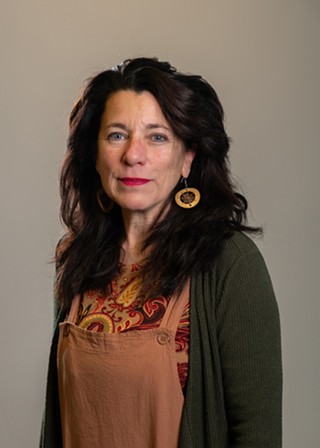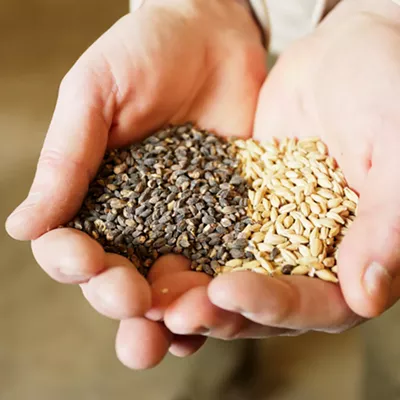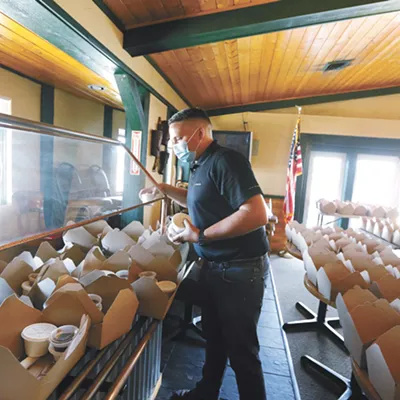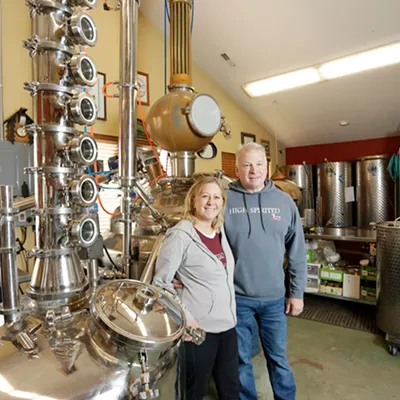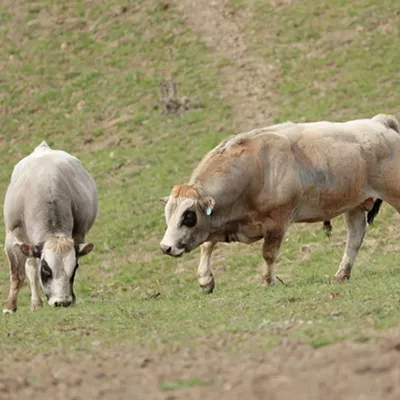
Americans eat an estimated 44 pounds of bread every year.
For many, that means perfectly sliced pieces of a perfectly formed loaf encased in plastic and perpetually available at the grocery store. Bread's role as a mere platform for other foods, like peanut butter and jelly or lunchmeat, means flavor is secondary. So is nutritive value.
And although whole grains — and artisan breads — have gained favor with American palates, bread has not yet risen to its full potential as a flavorful, nutritious, substantive food on its own.
Enter Shaun Thompson Duffy, a fine dining chef-turned-baker who has dedicated more than 15 years to elevating bread baking.
"We have to change the way people think of bread," says Thompson Duffy, who immersed himself in every component of breadmaking — from raw ingredients to how bread bakes best to the role of neighborhood bakeries — in turn evolving the local market for craft bread.
Shortly after moving to Spokane in 2012, Thompson Duffy helped transform baking operations at Luna Restaurant's Bouzies Bakery by incorporating flour milled on-site.
In 2015, he formed Culture Breads, featuring fresh-milled flour in naturally yeasted artisan breads available by subscription. What started with a few dozen takers grew to nearly 200 subscribers.
Then in 2018, Thompson Duffy installed Culture Breads in the South Perry neighborhood building that would become the Grain Shed. Now, the shop on East Newark Avenue and South Laura Street is equal parts bakery, brewery and community hub with live music, a modest food menu and special events like falafel night.
The Grain Shed is also an innovative business model: a worker's cooperative Thompson Duffy co-founded with brewer Teddy Benson, Joel Williamson — also a brewer who co-founded Local Inland Northwest Cooperative (LINC) Foods and LINC Malt — and Don Scheuerman, who co-owns Palouse Heritage farms in Endicott, Washington.
But it always comes back to the bread.

DENSER, DARKER, CRUSTIER
"People think bread needs to be a real voluminous, fluffy loaf of bread, which is fine," says Thompson Duffy. But more people are also learning that artisan loaves are different — denser, darker, crustier — for a reason.
"Taking it to a certain darkness is really important for us [at the Grain Shed] because whenever you slice a piece of bread, you have just a very thin piece of the crust," he says, comparing the crust on artisan bread to the sear on a steak.
"And you have a lot of the crumb," he says, referring to the pillow-y interior of baked bread, "and so you really need a bold flavor in that crumb."
Where does that flavor come from?
Fat, because as the saying goes, fat equals flavor.
But other than adding oil to the dough — or baking it into bread and slathering it with butter — where can that fat be found?
An unlikely source: flour, probably one of the most mundane yet ubiquitous ingredients in all of baking.
"Flour has an oil content and so that oil is where we get the flavor," says Thompson Duffy, who loves to talk about flour. And where flour comes from (grain). And the parts of the grain (bran; the germ or seed embryo that would eventually grow into a plant; and the endosperm).
"Chefs don't want to talk about flour because it's not right-off-the-bat delicious," says Thompson Duffy, a Texas native who cooked his way across the U.S. under chefs like Randy Rucker and in places like Picasso in Las Vegas while simultaneously teaching himself about breadmaking.
The germ, he continues, is larger in heritage grains like the ones used in Grain Shed bakes. And larger germs equal more oil, which equals more flavor.
And, of course, Thompson Duffy also loves talking about bread, which is what brought him to Portland, where he worked at Tabor Bread, altering his culinary trajectory from fine dining to baking.
"I just absorbed all the knowledge," he says, adding that Culture Breads emulates a lot of what Tabor Bread founder, Tissa Stein, created.
While many artisan bakeries employ wood-fired ovens and "wild" (versus commercially packaged) yeast known as sourdough starter, Tabor Bread mills its own flour from locally sourced grains.
Culture Breads and the Grain Shed also mill their own flour from heritage grains grown less than 70 miles south of Spokane. (They come from Palouse Heritage, the farm owned by Scheuerman.)
These landrace varieties, and ancient grains like einkorn and spelt, are inherently more flavorful than modern grains for several reasons, Thompson Duffy says. Modern grains have been bred to have a smaller germ, which is sheared off during processing, even in whole grain flours. Opportunities — and flavor — wasted.
Working exclusively with Old World grains like Turkey red wheat and purple Egyptian barley has enabled Thompson Duffy to coax out a new world of flavors encased inside each variety of grain, flavors that manifest in the Grain Shed's various baked goods.
"You can taste a lot of different things [like] a lot of fruity notes," Thompson Duffy says. "Sometimes it tastes like raspberries."
Thompson Duffy is the first to admit — and laugh — about how much more work it is to mill its own grain.
"It's a pretty physical job. I mean you've got to lift up 50 pounds of grains over your head," Thompson Duffy says. There's also the chore of "chopping wood" for the wood-fired oven, he continues. "It's a physical job."
But the mill and bakery are inseperable.
"I wouldn't have a bakery if I didn't have a mill," Thompson Duffy says.
Although the mill can accommodate 300 pounds, it's typically only filled to a third of that, then set to the lowest and slowest setting.
"So the secret to milling is you want to mill low, and you want to mill slow," Thompson Duffy says. "You don't want to heat up the flour" because that impacts the flavor.
Milling adds around two hours to the overall baking process, not including letting the flour settle down.
"If the flour is right off the mill it's gonna act wacky" because the grinding activates the enzymes in the grain, which affects the dough, Thompson Duffy says. "It's really wild."
Letting it sit overnight helps, he says, but that also adds time to the overall baking schedule and has to be factored in.
Time, time, time. The clock is always ticking at the Grain Shed.
TEMPERAMENTAL OVEN
When the Grain Shed opens at 7 am, Thompson Duffy is well into his routine. He typically arrives by 2:30 in the morning, turns on the lights and maybe some music, "like '60s psychedelia to bluegrass to Beyoncé," depending on his mood, says the former music major who graduated from culinary school in Houston, Texas.
Thompson Duffy then checks the mood of the oven, a double-decker wood-fired model he had custom built in 2015 when he first started Culture Breads. Similar to a pizza oven, it's capable of face-melting temperatures, upwards of 850 degrees.
"If the oven's in a bad mood, then it's going to be a tough one," Thompson Duffy says.
The oven is also well into its shift, having been lit the previous afternoon and fed on Western larch and birch wood, which burns through the night and into the next morning producing ash that needs to be removed.
"We literally brush it out and we mop it just to have a nice clean chamber," Thompson Duffy says. When it reaches around 850 degrees, the oven gets shut down, and steam trays go in. The residual heat in the brick-lined interior and the steam is what bakes the bread.
Baking takes place over an eight-hour period, usually from about 3 am to 11 am, and at intervals from 10 to 15 minutes, up to 40 minutes.
When Thompson Duffy arrives before dawn, he checks to see how much residual heat remains in the oven's brick-lined interior.
"That's gonna tell us how long we can bake so it's a very important number," he says.
In addition to baking for the Grain Shed and its affiliate businesses — the Grain Shed Taproom on South Cedar Street, and a new worker-owned place in Hillyard called Locos — the oven produces bread for places like Tavolàta, Rocket Market and Thomas Hammer. The bakery averages around 200 loaves a day, says Thompson Duffy, with some baking days also dedicated to specialty items like chocolate babka and challah.
Another morning task is checking all the doughs. If it's too cool, he explains, it won't rise properly, but if it's too warm, it rises too fast, which impacts flavor.
He does the same with the pre-fermented doughs — the levain, a mixture of fresh flour, water, and sourdough starter, as well the poolish, which is made using commercial yeast not sourdough starter.
Thompson Duffy wears a timer on his apron, checking it frequently.
"Breads and doughs are mixing," says Thompson Duffy. "We're running for croissants, we're running for cookies, we're running to make sure we usually have some extra things to bake off rolls."
To be successful in a bakery like the Grain Shed, says Thompson Duffy, employees don't need baking experience as much as the ability to multitask.
Thompson Duffy equates it to working in restaurants and "you've got a lot of tickets coming in, you have to juggle things in your head, like what to fire." Picture the kitchen from Hulu's The Bear, minus most of the noise and cursing.
"It's sort of like that," he says, "only it occurs at four in the morning."
He wouldn't have it any other way. "I really thrive off chaos," Thompson Duffy says.
TAMING HEAT
The oven, the dough, the starter. Not only is it all impacted by temperature — spring and fall are the most challenging times to regulate the breadmaking process — humidity is another factor.
"If it's really humid outside, flour doesn't want to absorb as much water, and if you put too much water in it, then it's gonna be a challenge," Thompson Duffy says. "It's a pancake."
Every new batch of heritage grain requires a similar testing period, says Thompson Duffy, who is looking forward to the August through September harvest (when he'll get to watch the grain being harvested and also ride the combine, he says).
"We have some guidelines, some rules to follow," he says, but they can't skip steps or hurry the timeline of discovery without impacting the quality and flavor of what the Grain Shed produces.
"So it's like a three-day process from start to finish before [the dough] goes in the oven," Thompson Duffy says.
All that for bread that might get snarfed up in just a few minutes?
Indeed. And in addition to helping rekindle our love affair with bread, Thompson Duffy and the Grain Shed have helped reframe our relationship with the neighborhood bakery.
It's community, Thompson Duffy says. "It's why I opened up the bakery to begin with."
Thompson Duffy loves baking bread and providing food, "but the thing that I really want to accomplish is like 25 years from now, whenever all the kids from the neighborhood are grown up and they have kids, they can talk about, 'Oh, you know what, whenever I was a kid, I used to go down to this little neighborhood bakery."
Another part of the job Thompson Duffy enjoys is the people who work with him, whom he says energize him and keep him young.
"The fact that I can teach someone to be a wood-fired baker, I think is really, really cool, because that's a skill that hopefully they'll take with them," he says. "You know, how to tame heat. It's a really difficult thing to do." ♦




